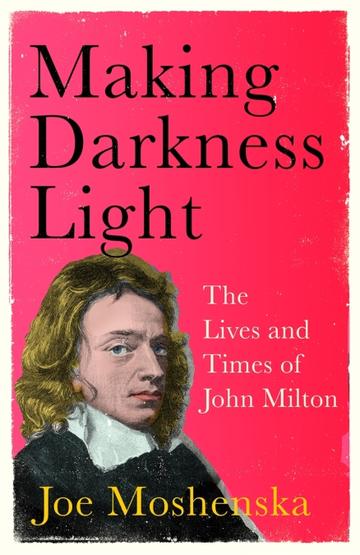Spotlight on Research: Making Darkness Light

My new book, Making Darkness Light: The Lives and Times of John Milton, was recently published in the UK and the USA by Basic Books. This is, in more than one way, a pandemic book. I couldn’t have completed it had I not been afforded more research time thanks to the award of a Philip Leverhulme Prize, which meant that I had to do less online teaching than many colleagues, although the pressures of home schooling meant that much of it got written late at night, in my college office, looking out onto a dark and deserted High Street. But it feels like a pandemic book in less direct and obvious ways as well.
It was always my intention to write a book aimed at generally interested, non-academic readers, and to bring myself and my relationship with Milton’s writing into what I wrote in certain ways (a plan partly prompted by a Radio 4 documentary that I made in 2017 in which I got to retrace Milton’s travels in Italy). The specific form that these intentions ended up taking was then variously formed by the experiences of the past two years, which have irreversibly transformed the ways in which we think about the configurations of our lives, our interruptions and our vulnerabilities; and, for those of us who care about literature, the place of our reading, of the writers and works that matter most to us, within these configurations.
As a result, I found myself writing not just about Milton’s remarkable life and works, but about my visits to places where he had lived or sojourned; my first experiences of reading and teaching his work, and what brought me to the study of literature in the first place; my struggles with the more alien or antipathetic aspects of Milton’s character and beliefs; and the way that his words had insinuated their way into my ways of thinking and being in the world.
My aim in all of this was to keep Milton’s poetry at the centre of his life, and of my relation with it – a notoriously tricky problem for literary biography, a form which necessarily runs the risk of presenting the work as reducible to, or causally arising from, the life. The chapter of which I’m proudest revolves around Milton’s stunning early poem ‘Lycidas,’ an elegy for his university acquaintance Edward King, and uses its haunting array of voices and mosaic of real and imagined places to bring in a chorus of later voices (Joyce, Beckett) and places, from the Dee estuary where King departed on his fateful voyage to the stately home, built on the site of the house where Milton wrote the poem, which was abandoned in the 1980s, its contents left slowly to rot and crumble.
Making Darkness Light is both continuous with, and a departure from, my previous research. My first book, Feeling Pleasures: The Sense of Touch in Renaissance England, began my concern to engage with the sixteenth and seventeenth centuries in terms of vividly realised and ambiguous forms of embodiment, and included a chapter on Milton (as well as others on philosophies of tickling and the early reception of Chinese pulse-taking techniques in Europe, among other topics). These concerns were developed in a different register in my third book, Iconoclasm as Child’s Play, which began with the phenomenon of giving reviled Catholic objects to children as a way of desacralizing them during the Reformation, but was as much a book about how we relate ourselves to the past as it was about the ways in which early modern people did.
In between these books I wrote A Stain in the Blood: The Remarkable Voyage of Sir Kenelm Digby, a book about a seventeenth century polymath who wrote on topics ranging from cookery to the immortality of the soul, focusing on his 1628 privateering voyage in the Mediterranean. This was aimed at the general reader, and was my first substantial attempt to bring the dazzling complexities of the early modern world that so preoccupy me to a wider audience.
My books seem at first glance to alternate between ‘academic’ and ‘non-academic,’ but I prefer to see my writing as seeking to trouble the clarity of this distinction even as I move back and forth in my primary emphasis. If my most recent book is partly a product of the pandemic, I also couldn’t have written it in the form that it ended up taking had I not moved to Oxford in 2018 and joined an English Faculty full of colleagues taking parallel risks with their own writing, exploring new ways not just of thinking but of writing about literature, and of keeping it alive.
Joe Moshenska is Professor of English literature and a Tutorial Fellow at University College. He grew up in Brighton, with interludes in France and Zimbabwe, and studied at Cambridge and Princeton. He taught at Trinity College, Cambridge for eight years before joining the Oxford English Faculty in 2018



